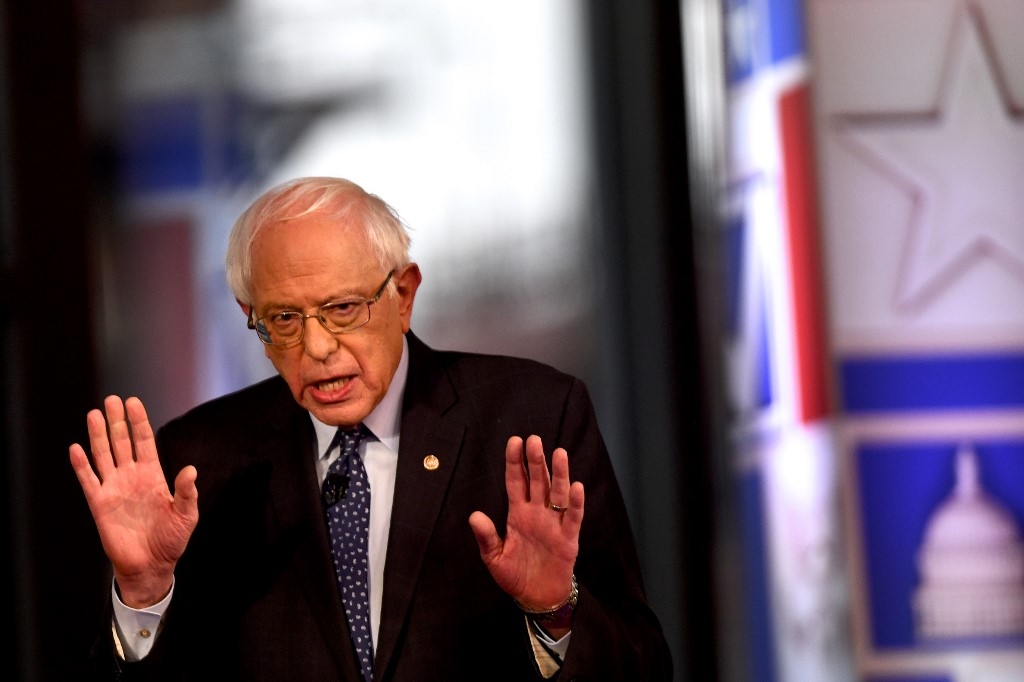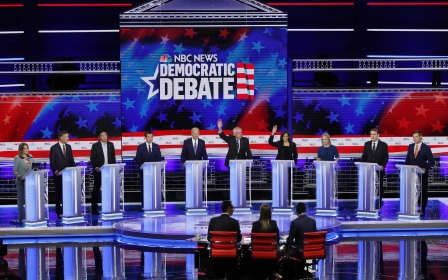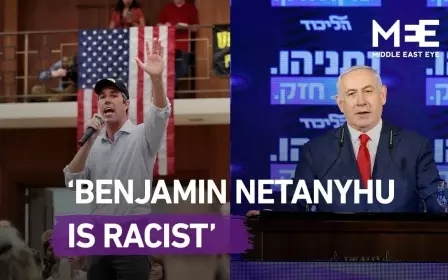US could leverage aid to force Israel to change its policies: Bernie Sanders

Bernie Sanders has said the United States could leverage billions of dollars in aid to Israel to get the country to change some of its policies.
The Democratic presidential hopeful said late on Tuesday that US funds to Israel could be used to pressure the Israeli government to "end some of the racism that we have recently seen" in the country.
"The United States government gives a whole lot of money to Israel, and I think we can leverage that money to end some of the racism that we have recently seen in Israel," Sanders said at a town hall meeting in New Hampshire.
"The goal of the United States ... is to bring people in the region together, the Palestinians and the Israelis, to create a kind of workable peace which works for both parties, not just one."

Support for Israel has been a linchpin of US policies in the Middle East for decades, with both major political parties in the United States providing near-unequivocal backing to the Israeli government.
But in recent years, more progressive members of the Democratic Party have voiced their opposition to Israeli human rights abuses against Palestinians while also calling for Washington to hold Israel accountable for its destructive policies.
Earlier this year, the top 2020 Democratic candidates skipped the American Israel Public Affairs Committee's (AIPAC) national conference in Washington - a move advocates said signalled that the discourse on Israel and Palestine in the US is shifting.
But the US government continues to funnel billions of dollars to Israel.
In 2016, former US President Barack Obama signed an agreement to provide Israel with $38bn in military assistance over 10 years - the largest military aid package in US history.
"For as long as the state of Israel has existed, the United States has been Israel's greatest friend and partner, a fact underscored again today,” Obama said in a written statement when the deal was announced.
The US-Israel relationship also has been bolstered under Donald Trump, who is a staunch supporter of Israeli Prime Minister Benjamin Netanyahu.
'The United States government gives a whole lot of money to Israel, and I think we can leverage that money to end some of the racism that we have recently seen in Israel'
- US Senator Bernie Sanders
Since coming into office, Trump has moved the US embassy to Jerusalem, cut off aid to Palestinian refugees and withdrawn from international organisations critical of Israel.
He also recognised Israel's control over the occupied Syrian Golan Heights, a decision that was widely condemned - but personally welcomed by Netanyahu.
"Over the years, Israel has been blessed to have many friends who sat in the Oval Office, but Israel has never had a better friend than you," the Israeli premier told Trump after the US president signed the Golan proclamation in March.
Trump has also sought to use Israel as a wedge issue ahead of the 2020 elections, repeatedly lambasting Democratic Party lawmakers for criticising Israeli government policies.
For his part, Sanders has spoken out before against the Israeli occupation and human rights abuses against Palestinians.
"To be critical of a right-wing Netanyahu government in Israel is not to be anti-Semitic," he said on Tuesday.
'Corrupt, murderous' Saudi regime
At the town hall, Sanders also criticised the Trump administration for failing to reassess US support for the government in Saudi Arabia, which the Vermont senator described as a "corrupt, murderous regime".
"Why have they been our allies for so many years?" Sanders said.
"Trump and his good friend [Saudi Crown Prince] Mohammed bin Salman there - who murdered, as you know, a journalist, [Jamal] Khashoggi, in cold blood."
The US president has been under pressure for months to hold Riyadh accountable for the murder of Khashoggi.
A prominent Washington Post columnist, Khashoggi was killed by Saudi government agents inside the country's Istanbul consulate in October.
Trump has stood by his Saudi allies despite the pressure, however.
His administration has so far refused to release the results of any internal investigations into the Khashoggi assassination, and he personally vetoed attempts in Congress to end US support for a Saudi-led coalition waging war in Yemen.
Middle East Eye propose une couverture et une analyse indépendantes et incomparables du Moyen-Orient, de l’Afrique du Nord et d’autres régions du monde. Pour en savoir plus sur la reprise de ce contenu et les frais qui s’appliquent, veuillez remplir ce formulaire [en anglais]. Pour en savoir plus sur MEE, cliquez ici [en anglais].





